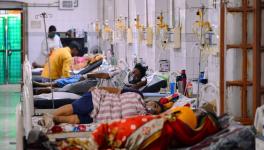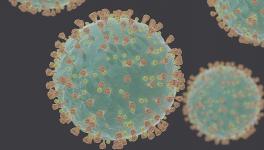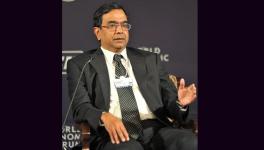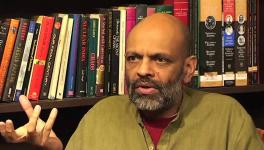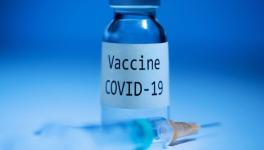Booster Shots and Omicron: A Misconceived Concept?
There is much discussion these days on whether to introduce booster shots in India, both generally in response to the COVID pandemic and in the specific context of the Omicron variant of the virus. So far, recommendations for boosters by many experts are being made based on very thin evidence. There is still serious shortage of definitive analysis of effectiveness of boosters for protection against infection by Omicron or its transmission.
Importantly, effectiveness against serious disease, hospitalisation and death, which are the primary objectives of vaccination programmes, is also not known with any certainty. The suggestions favouring boosters unfortunately also ignore well-established scientific knowledge and public health experience about measures to deal with the COVID-19 pandemic, irrespective of the variants involved, and which even today provide the most effective first line of protection for the general public against the virus.
Experience with boosters around the world so far shows that there are no easy answers to the many questions raised, especially since experience with vaccinations, boosters and other precautions or restrictions have been varied.
Boosters and effectiveness
As an idea, booster doses of vaccines are well known. In India, the older generation will remember receiving a booster vaccination a few years after the first one against small pox, and even today several vaccinations for infants require boosters as do anti-tetanus shots. For COVID-19, given all the unknowns of this new virus and the rapid time scale in which vaccines were developed, it was simply not known if a booster dose would be required or not.
Serious discussions about booster shots started much before the appearance of the Omicron variant, roughly in mid- to late-2021 when the Delta variant was once again raging across the world, and after the first wave dominated by the original virus had ravaged Europe and North America. Some experts in the US and elsewhere started looking at possibly declining protection of vaccines with time, and also with respect to the new variants. The Biden Administration had been pushing for booster shots since August 2021, but the Food and Drug Administration and US Centers for Disease Control (CDC) approved booster doses for all age-groups only in September 2019, and extended this to the 16-17 year age-group soon after. This idea was also, of course, pushed by vaccine companies.
Israel was among the earliest to pick up on the idea of booster doses, having also been early in rolling out a vaccination programme towards the end of 2020. In mid-2021, during the Delta wave, Israeli studies showed that protection from the Pfizer-BioNtech vaccine was declining. So, in August 2021, Israel started administering boosters to the elderly and gradually extended this to everyone over 12. Israel has fully vaccinated around 63% of its population with the Pfizer BioNtech vaccine, another 50% have received one dose, and about 50% have received a booster shot. While Israeli and other experts ascribe these successes to the early vaccination and boosters, the exact role of boosters is actually not very clear, since its case rate and even fatality rates in relation to population ranks it somewhere in the middle compared with other countries.
The US is, of course, a peculiar case, with a large pool of unvaccinated people driving an extremely high infection rate and also a heavy death toll. The US currently reports one-fifth of all infections worldwide, with rising infection rates and COVID-related deaths having crossed 800,000. But data from late summer in the US shows extremely low hospitalisations among the vaccinated even when they do get re-infected, which happened to only one out of every 5,000 vaccinated people. The CDC, before the advent of Omicron, maintained that existing vaccines are working well to protect against serious illness, hospitalisation and deaths, yet some decline in protection against infection and mild or moderate disease is being observed, and is hence recommending boosters.
Boosters and Omicron
The onset and rapid spread of the Omicron variant has given further impetus to the push for boosters. Omicron is perceived to be able to evade vaccines or anti-bodies, and is also believed to have greater transmissibility than the Delta variant. However, while there is some data to support the claims on infection and transmission, the World Health Organisation (WHO) maintains that there is little or no evidence so far to suggest that chances of contracting severe disease leading to hospitalisation and death may be higher from Omicron than Delta or other variants.
Yet, the worry in some countries is that, if number of positive cases multiply much faster, cases of severe disease may be so many as to overwhelm hospitals and the health care system. The UK, for instance, facing a huge surge of around 70,000 cases daily, mostly of the Delta variant, initially introduced booster shots for 18+ age groups with a target to cover the population by end-January.
In view of a sharp rise in Omicron cases, the UK declared a "COVID Emergency" and advanced the target date to end-December. Government health experts projected that around 2,400 hospitalisations per day, or three times present rates, could occur even in a best-case scenario where vaccines and boosters work well against Omicron, rising to 6,000 per day if vaccines and boosters are less effective than hoped.
There is a noteworthy catch in the official UK booster recommendation, with relevance for India. The authorities have recommended only Pfizer or Moderna boosters after full vaccination with any vaccine, and the Oxford Astra-Zeneca vaccine is recommended as a booster only in such cases where the patient cannot take Pfizer or Moderna shots for medical reasons.
Reason given is that the Astra-Zeneca vaccine, made in India and known as Covishield, is believed to be not as effective as a booster since it may not increase T-cells. WHO has also recommended that vaccines based on inactivated virus, such as Covaxin and the two Chinese vaccines, Sinovac and Sinopharm, may also require boosters for the immune-compromised, due to lower effectiveness of these vaccines over time.
A larger study of 78,000 persons infected with Omicron has been conducted in South Africa where this variant was first detected. Of the total, about half had been fully vaccinated with the Pfizer vaccine. It was found that the vaccine had an effectiveness of around 80% against the Delta and other variants, but this dropped to around 30% against Omicron. However, while the two-dose vaccine offered about 90% protection against severe disease and hospitalisation earlier, this level of protection dropped less sharply to around 70% for Omicron, clearly showing that protection of the vaccines against severe disease remained high even without boosters.
All in all, therefore, the evidence for use of boosters specifically against Omicron is thin, keeping in mind that the primary purpose of vaccination is to protect against severe disease and hospitalisation. Transmission of Omicron, even if greater than the Delta variant, needs to be checked not only through wider vaccine coverage but also through COVID-appropriate behaviour and related societal restrictions as regards masking, ventilation, avoidance of crowded spaces and large gatherings. Over-reliance on only technical interventions such as vaccines, and now boosters, undermines the overall societal effort essential for combating the pandemic.
Global Equity and Protection
WHO has been ceaselessly emphasising that booster shots are gravely undercutting global equity while also actually damaging the response to the pandemic which should be global in order to be truly effective.
The Director General of WHO, Tedros Adhanom Ghebreyesus, has even termed the booster programme “a scandal that must stop now.”
Booster doses are being administered in richer countries than primary doses in poorer countries. Over 92 countries are said to have informed WHO about intentions to start booster programmes, and none of these are low-income countries. Wealthy countries have fully vaccinated an average of 65% of their population, while low-income countries have vaccinated less than 4%. In August this year, the WHO Chief had called for a global moratorium on booster shots.
This is not just an ethical issue. The world has seen how quickly a single infected person, coming in to a country from another nation where a variant like Omicron is prevalent or may even have originated, has seen the rapid spread of the variant to the point where it even threatens to become the dominant strain of the virus behind COVID-19. The longer there are large pockets of unvaccinated people in the world, or within countries, the more opportunities are created for the virus to mutate and possibly take on more deadly forms. Last year, the Delta variant rampaged around the world, next year it could be Omicron, and so on down the Greek alphabet.
Yet the world, particularly countries with more resources, has failed miserably in this task. Better-off nations have preferred to look after their own. This is an understandable sentiment but one that is also self-defeating. To repeat the old cliché, nobody is safe until everybody is safe from the virus.
Not only is there insufficient evidence to support widespread booster programmes, rather than boosters targeting against vulnerable categories such as the immune-compromised, the concept itself is currently misconceived.
What Does India do?
Needless to say, a chorus is building in India in favour of boosters, even though there is little evidence to support it. However, as stated by the government to the Delhi High Court, so far the agencies concerned, National Technical Advisory Group on Immunisation or NTAGI and National Expert Group on Vaccine Administration for COVID-19 or NEGVAC of the Union Government, have not pronounced on the matter saying evidence is inadequate.
India has fully vaccinated 37.5% of its adult population and has administered a single dose to another 22%, with current daily vaccination rates of around 7-8 million per day. Clearly, India will miss its target of vaccinating its entire adult population by the end of this year by a long way. All indications are that this is not a problem of production capacity per se, but one of supply management and of capacity to administer vaccines at scale.
The main indigenous manufacturer, Serum Institute of India in Pune, which makes Covishield and has supplied around 90% of all vaccines used so far, has indicated that it is preparing to cut back production by 50% due to lack of orders from the Government. The other manufacturer, Bharat Biotech, continues to fall far short of all its promises despite full partnership and collaboration with the Government. This is not the place for a detailed discussion of this issue, so suffice it to say that there is a huge gap between production and need.
Besides this, India also has an obligation to supply the global Covax facility used to provide vaccines to low-income countries which it has been unable to do, and has only recently resumed a small trickle of such exports.
Apart from the thin evidence, as discussed above, therefore, even a discussion of a booster programme at this stage is moot. This may depend on imported vaccines for supply and also if recommendations against Covishield or Covaxin are to be accepted. If only domestically made vaccines are to be used, then boosters will only mean further slowing down of the basic vaccination programme, exposing a large section of the population to the virus while catering to a few. If at all entertained, booster doses may be considered only for the elderly with co-morbidities.
Get the latest reports & analysis with people's perspective on Protests, movements & deep analytical videos, discussions of the current affairs in your Telegram app. Subscribe to NewsClick's Telegram channel & get Real-Time updates on stories, as they get published on our website.













